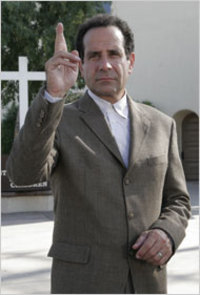Spencer’s Pilots…with a great theme by Morton Stevens.
Month: February 2008
Mr. Monk and the Parallel Universe

I thought the two-part MONK season finale was great, but it points out one of the pitfalls of writing a tie-in series while the TV show that it is based on is still in production. It means that there are going to be some continuity miss-matches between the TV series and the books…and there’s nothing that can be done about it.
I finished my book MR. MONK GOES TO GERMANY back in October 2007 and it will be published in July 2008. In between that time, the MONK writers wrote, produced and broadcast the season finale. I am now well into writing MR. MONK IS MISERABLE, which comes out next winter…by the time I deliver that manuscript, the MONK writers will have just begun writing the season seven scripts. You can see the problem.
Andy Breckman, the creator and executive producer of MONK, knows in advance what I will be writing and approves the storylines. But I certainly don’t expect him or his staff to feel creatively bound to any of the events or details that I create in my books. The show comes first. That said, there are bound to be diehard fans who expect strict continuity between the books and the TV series …and they are going to stumble over a few miss-matches.
Both my book and the finale, "Mr. Monk is on the Run," involve Monk encountering a man with six fingers on one hand. That’s actually okay. A fan could assume that my book takes place before the events in the season finale. In fact, it only reinforces Monk’s attitude towards the "second" man with 11 fingers that he meets. The book and the episode would fit together pretty well chronologically, "factually," and even emotionally, if not for the last scene of the two-parter.
Oh well.
I have a disclaimer in my books that warns readers that, while I try hard to stay close to the continuity of the show, the long lead time of the books makes that next to impossible (an entire season is produced between when I turn in the book and when it comes out).
I read all the scripts and I talk to Andy about what he has in mind for the season ahead, but even so, continuity problems are bound to happen. Hypothetically, for example, Sharona may come back on the show some day and the story they come up with may have nothing to do with MR. MONK AND THE TWO ASSISTANTS (and, unless they adapt the book, won’t acknowledge those events at all).
I don’t obsess about the miss-matches and neither does Andy. He once said to me that, in his mind, the Monk TV series and the Monk books are separate entities…the same characters in parallel universes…and while they are consistent with one another most of the time, there are bound to be some differences now and then.
There’s the TV shows and there are the books. They are not one in the same. He is okay with that and so am I. I hope that most of the fans will be, too.
Mannix comes to DVD
 Back in November, the Washington Post wrote about MANNIX and efforts by fans to get the iconic private eye show on DVD. Well, I guess the publicity paid off. TVShowsonDVD reports that the first season of MANNIX is coming to DVD in June. But that first year of the show was about an "old school" detective Joe Mannix (Mike Connors) working for a "high-tech" computerized detective agency run by Joseph Campanella. The ratings weren’t great so, for year two, it became a straight-forward, old-fashioned, PI show with Joe Mannix on his own, aided only by his secretary (Gail Fisher) and his various friends on the police force. The ratings rebounded and the show ran for seven more years. It was canceled while it was still a hit, making a baffled Connors wonder if then CBS-boss Fred Silverman was simply tired of the show…
Back in November, the Washington Post wrote about MANNIX and efforts by fans to get the iconic private eye show on DVD. Well, I guess the publicity paid off. TVShowsonDVD reports that the first season of MANNIX is coming to DVD in June. But that first year of the show was about an "old school" detective Joe Mannix (Mike Connors) working for a "high-tech" computerized detective agency run by Joseph Campanella. The ratings weren’t great so, for year two, it became a straight-forward, old-fashioned, PI show with Joe Mannix on his own, aided only by his secretary (Gail Fisher) and his various friends on the police force. The ratings rebounded and the show ran for seven more years. It was canceled while it was still a hit, making a baffled Connors wonder if then CBS-boss Fred Silverman was simply tired of the show…
I know both sides of the story (I worked with Connors and Silverman), but I’m not telling. Maybe Connors will tell you more about it in the interview that comes as one of the DVD extras.
Mr. Monk und die Montagsgrippe

The German edition of MR. MONK AND THE BLUE FLU just came out, and is already getting some very nice reviews, including this one (in German, of course!) from Alligatorpapiere. He likes the first two books in the series, too.
It’s Just Pathetic
The Diary of a Mad Editor tackles the fanfic issue. He says, in part:
[…]fan fiction isn’t a bad thing just because the writing’s
bad – it’s bad because it also undermines the integrity of the original
work […]Clearly, though, there is a difference between what Goldberg writes and what some acne-faced turd on Quizzilla.com or FanFiction.net writes.[…]See, Goldberg’s
writings are licensed by the original creators of the characters he
writes about whereas fan fictioneers are infringing on the original
authors’ copyright.
One form of writing is done by professionals for commercial purposes
and the other is done by delusional amateurs purely for love/self-love.
Here’s the problem — now the fanfic losers want copyright protection
extended to their “original” creations.
He believes that if the efforts by the Organization of Transformative Works to extend copyright protection to fanfic are successful, it could have a wide-ranging, negative impact on all writers.
If fan fiction receives legal parity with original work, it would
create a wave of frivolous lawsuits in which any author of fan fiction
could claim that the original author stole their ideas. As a writer, I
cringe at this very thought. Giving derivative works that kind of
legitimacy would destroy any value intellectual property protection has
for writers.
I think he sums up the fanfic issue pretty concisely when he says:
A 14 year old kid writing fan fiction is unfortunate but forgivable,
but when you’re 30 and still writing it, it is just pathetic. If you
want to be taken seriously as a writer and have full copyright
protection and all that good shit, write something original and worth
reading.
Only in L.A.
Yesterday, I was having coffee with a writer friend of mine at the Starbucks in Pacific Palisades. My friend was telling me some of the pilot ideas that he’s going to pitch this week and wanted my opinion of them. But that’s not all he got.
A stranger spoke up from the next table. "I have to disagree. I couldn’t help over-hearing. I think the guy should be more working class, a plumber or something."
"I don’t think so," said a stranger at another table. "Working class works for me."
Neither stranger was in the TV business, but they wanted to give my friend their input, since they were eavesdropping anyway…
Only in L.A.
Don’t Expect the “Truth” about Self-Publishing from Someone Who Runs a Vanity Press
Earlier this month, I told you about a scam called "Beneaththecover.com," which purports to offer authors inside news and expert advice about the publishing industry when, in fact, it’s just a front for a bunch of vanity press and book promotion hucksters selling their wares. This point was driven home the other day when one of their so-called "experts," vanity press publisher Yvonne DiVita, offered this outrageous lie in a post she had the chutzpah to title "POD Myths Dispelled – Get The Scoop Here":
In today’s
emerging digital world, if you truly want to attract that big name
publisher, use a professional POD firm to self-publish because the big
name publishers are watching.
The best way to attract a publisher is to write a good book, not blow thousands of dollars having it printed in POD form by a vanity press. If anything, printing your book in POD is more likely to prevent a publisher from taking you or the book seriously.
DiVita is one of a pack of POD vanity press hucksters who prey on the gullibility, desperation, and ignorance of aspiring authors. She argues that vanity presses aren’t merely printers but real publishers because they pay more attention to their authors than real publishers do. What she neglects to mention is that vanity presses like hers make the vast majority of their money off their authors, not from booksales, and that all that attention they slather on their clients (not authors, ladies and gentlemen, clients) is to convince them to spend even more on their worthless services. She writes:
IF authors don’t sell enough books with their publisher, POD
or otherwise, the author isn’t trying hard enough. I’ve worked with
traditional publishers, and they require an extensive marketing plan
from authors before they will consider publication. And research shows
that books published by traditional publishers sell around 150-300, on
average.
That’s right, blame the author for the fact that their POD vanity press books aren’t sold in stores and are unlikely to sell to anyone but the client… and then back it up with pointless "facts."
I’ve had over two dozen books published by real publishers. No editor has ever asked me for an "extensive marketing plan" before considering my books.I’ve also asked a few published friends…and they have never been asked for marketing plans, either. But they are novelists, and perhaps they would be asked for one if they wrote non-fiction. So let’s give DiVita the benefit of the doubt and say publishers want marketing plans along with non-fiction book proposals. To which I say… So what? How is that a persuasive argument for going to vanity-press instead of a real publisher? You’ll need a marketing plan either way. The key difference is that a real publisher will pay you and a vanity press will ask for your credit card number.
I’ve scoured the web and I can’t find any "research" that backs up her outrageous claim that most books published by genuine publishers sell only 150-300 copies.
The closet statistic I could find to her numbers was a 2004 Bookscan study that tracked sales of 1.2 million books sold that year. According to their figures, the average book of any kind published in 2004 sold 500 copies. The study noted that only 25,000 titles sold more than 5,000 copies each,
500 sold more than 100,000 copies and only ten sold more than a million
copies. But the figures are controversial, because the sales were not broken down by genre, like fiction or non-fiction, nor did they differentiate between titles from large
publishers or small ones, traditional publishers or vanity presses.
But lets pretend her figures are right. How is that an argument for going to a vanity press? Authors published by real publishers whose books only sold 500 copies in 2004 were still paid to be published. They earned money, though not as much as they’d hoped.
By comparison, most vanity press authors will lose money because they paid to be published. But don’t take my word for it, let’s look at the 2004 sales figures from iUniverse, the biggest name in self-publishing:
18,108: Total number of titles
published792,814: Number of copies
printed14: Number of titles
sold through B&N’s bricks-and-mortar stores (nationally)83: Number of titles that sold at least 500
copies
Out of 18,000 titles and nearly 800,000 copies printed, only 83 authors sold more than 500 copies. Good God. Think of all the money that authors lost …and how much iUniverse made. That’s the business that DiVita is in…and it’s a profitable one. For the printer, not the author.
So what is the truth about POD self-publishing companies? It’s obvious. Vanity presses are in the "author services business", not the publishing business which, in a rare bit of candor, even DiVita concedes on her vanity press website:
Windsor Media Enterprises specializes in author services. We offer idea development, manuscript critiquing, editing, proofreading, formatting and cover design, for new and existing authors.
And for that, they charge you a price and that’s how they make their money. That is their business. And if your book, by some miracle, manages to sell a few copies, they make a little more.
A vanity press will tell you any lie they can to convince you that they are real publishers (when they are merely selling editing and printing services), that self-publishing is the route most successful authors take (it’s not), and that you have as much of a chance to sell books with them as you do going with a traditional publisher (you don’t).
Is Yvonne DiVita really someone qualified to give writers sound advice? Or is she someone with a clear conflict-of-interest hoping to coerce naive authors into buying her product? The answer is obvious, and it came right from the founders of Beneaththecover.com when they tried to solicit my brother Tod into being one of their experts:
Beneath the Cover is a cooperative venture for building marketing platforms of everyone involved.
That’s what should be written on the masthead of their home page, not "Where book industry professionals who know almost everything go to discuss news, insights, and evolving industry issues." And it should be stated in big print on each and every piece of "advice" that they give.
Raiders of the Lost Movie Posters

Posterwire, one of my favorite blogs, led me to this excellent site dedicated to the amazing work of Richard Amsel, the artist behind the original INDIANA JONES posters, as well as memorable one-sheets for HELLO DOLLY, THE STING, THE SHOOTIST, MAD MAX: BEYOND THUNDERDOME and many other movies.



